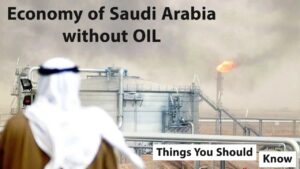Let’s Analyze Saudia Arabia Economy without oil
The petroleum division accounts for around 87% of Saudi budget incomes, 90% of export revenues, and 42% of GDP. Saudi Arabia\’s oil assets and production are mainly managed by the state-owned company Saudi Aramco. Another 40% of GDP comes from the private sector.
How much time will Saudi oil last?
Saudi Arabia has confirmed reserves equal to 221.2 times its yearly consumption. It means that, without Net Exports, there will be around 221 years of oil (at current using levels and excluding unconfirmed assets).
“No one is saying it’s going to be an easy transition” said Andrew Grant, a senior analyst. “It’s a matter of when, rather than if”
Kingdom’s vision 2030 started in 2016. The vision goals to expand Saudi Arabia’s economy away from oil by applying many social and economic transformations. Following is some of the main improvements planned in a timeline:
2016:
- The government approved a law to let foreign Businessmen buy exchange-listed debt instruments to attract foreign capital to its market.
- The government applied the Saudization package in which businesses across the Kingdom are compulsory to employ Saudi citizens in various sectors. Women\’s contribution to the workers has been growing.
- A tax on immature urban lands was announced. In addition, a set of rules were approved to allow external investors the right to own 100% of trade and wholesale businesses.
2017:
- Future Investment Initiative (FII) His Highness Crown Prince Mohammed bin Salman assured to return Saudi Arabia to “moderate Islam.” He said he will reform the state into a more open culture that permits citizens and welcomes investors and travelers.
- The State presented a tax on prices of tobacco goods and their byproducts by 100 percent.
- The Kingdom elevated a 35-year prohibition on cinemas and concerts across the state as part of Vision 2030’s ambition to advance the country’s theatre sector. Many local and worldwide festivals, performances, and events have been happening later then.
- The establishment of Neom a $500 billion cross-border city on the shoreline of the Red Sea, set to join smart city technologies and Work as a tourist destination.
2018:
- At the start of the year, the Kingdom presented a 5% value-added tax (VAT) program for the first time, as well as a price climb up to 127 percent in petrol prices, lifting its decades-long support program on fuel (the fuel charge in Saudi Arabia still very low-priced associated to the rest of the world).
- Saudi Arabia won the MSCI Emerging Market position in June. As an effect, the stock market observed more than 75 billion riyals of external investments.
- Allow women to drive.
2019:
- The Kingdom eased a 49% external ownership limit for strategic investors in shares of listed companies.
- In an enhancement for its tourism sector, Saudi Arabia introduced e-visas to people from 49 nations for the first time in September. As a result, the Kingdom received more than 500,000 tourists since September 2019.
- Aramco, the Saudi state-owned oil company, went public at $2 trillion
What will happen to Saudi Arabia Economy if nobody purchases oil any longer?
The supposition that people will swiftly, or steadily, not purchase oil at all is misleading. Oil is a vital element fundamentally in everything we own (not only gas). Nevertheless, Saudi Arabia is getting ready for the post-oil era.
Solar energy since Saudi Arabia gets so much sunlight all year round
The government is investing heavily in renewable energy, specifically in solar energy since Saudi Arabia gets so much sunlight all year round which will be sufficient to meet local demand for energy and sell the remaining stored energy to the rest of the world, remaining yet again an energy provider.
Besides investments in renewables, Saudi Arabia is diversifying its economy away from oil through tourism, its Public Investment Fund (PIF), and mega-projects like NEOM and the Red Sea Islands as part of its Vision 2030.
Also Read:






